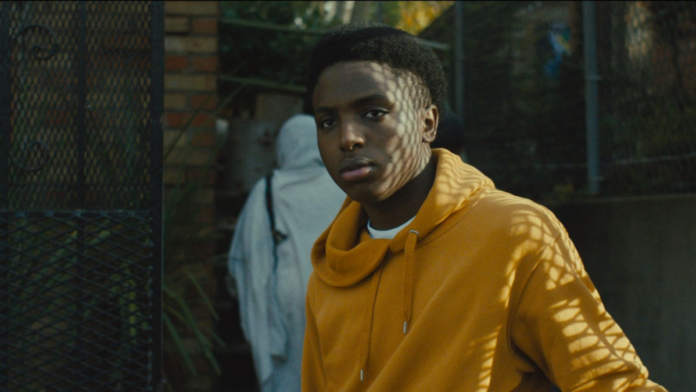What does it mean to belong to a space? You can stay somewhere, but that doesn’t necessarily mean you belong. This is the plight of Robel (Joseph Smith), an Eritrean-American boy of 15, and his family. His parents moved to America in search of a better life for their family, but leaving behind a home while trying to occupy another is a difficult thing. His mother Amuna (Selamawit Gebresus) describes this situation perfectly when she talks about how she rescued a couple of birds and nursed them back to life. Once the birds have recovered, they possess the freedom and capacity to leave, but Amuna is stuck trying to make this life and space work for her. It’s the same for Robel and his sister Fayven (Esther Kibreab), whose lives revolve around their various familial responsibilities.
Director Zia Mohajerjasbi allows us to feel what they feel by situating most of the early part of the movie in the family’s small apartment. It begins to feel claustrophobic, with nights interrupted by incessant phone calls from Amuna’s sister-in-law and urgent wake up calls in the mornings because of the obligations Robel has to take care of. Empty the trash, take care of his Baba, be the intermediary for his mom and landlord. He can’t even leave the house for 5 minutes to buy some food without coming back to get lectured by his mother.
Robel’s interactions with his mom and family feel so true to real life; his banter with his sister, his mom’s constant victimhood, and how everything in the family revolves around her and her demands. It is about 40 minutes in that Robel finally leaves the house so that he can deliver a suitcase for his mom to a sick relative. We, like Robel, heave a sigh of relief once he’s finally out of the house and on a bus.
Know Your Place is gorgeously shot, and even in dim spaces like Robel’s family home, everyone’s faces are sufficiently lit in a way that feels natural and not overdone. The cinematography helps make the space feel real, breathable, as Robel’s makes his journey with his best friend Fahmi (Natty Moges) through the streets of Seattle. Adding to Robel’s sense of dislocation are constant reminders that the space itself isn’t very welcoming. He meets a commuter on the bus who wants to preach to him about Jesus, but speaks to him in a way that’s so disconcerting and off-putting, and his quick trip to the convenience store has him dealing with a store clerk who’s talking about role play and other weird stuff while ringing up his purchases. There are also racially-charged encounters, where Robel and Fahmi’s mere presence is enough to trigger certain assumptions.
It shouldn’t be so difficult for Robel to get the suitcase where it needs to be, but he’s met with obstacle after obstacle, and his lack of roots in the space means he needs to depend on Fahmi’s connections. The movie’s intent is clear: in order to know your place in the world, you need to know your place. Build connections, get to know people, don’t let yourself drown in a sea of names.
Review screener provided.
REVIEW SCORE: 3.5/5

